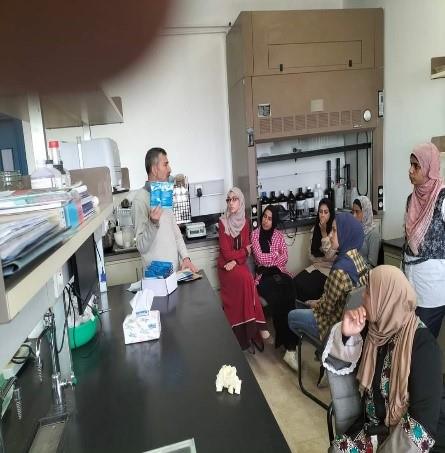Capacity building activities in Jordan to enhance the dairy value chain sector in north Jordan valley.

22 February 2022 - The Food and Agriculture Organization of the United Nations in collaboration with The International Center for Agricultural Research in Dry Area (ICARDA) under the regional project “Water Efficiency, Productivity and Sustainability in the NENA region” by enhancing water use efficiency and productivity in dryland agriculture, through providing household and community level support.
This activity aimed at enhancing the socio-economic livelihoods and resilience of rural communities in the north Jordan Valley. It involved the establishment of livestock dairy units and related capacity-building programs for enhanced productivity and food quality for local consumption and for potential income generation.
Dairy processing in Jordan is practiced on different levels, from household level in the villages to industrial level. Women are at the center of the dairy processing sector in Jordan, forming the majority of the sector’s workforce; they are a key contributor to household incomes and rural economies. However, there is a lack of proper hygiene practices at the houses and small processing units, affecting the product quality and, thus, the income. Ongoing efforts to improve the productivity, hygiene, and profitability of dairy products provide an opportunity to improve women’s livelihoods fundamentally.
This said, FAO in collaboration with ICARDA have organized a training course between 21 and 22 February 2022, where 21 beneficiaries (18 female and 3 male) attended, representing four villages in the region from the northern Jordan Valley. The training took place in Elgaren village at the Sustainable Agriculture Cooperative.
Knowledge gaps in dairy processing were assessed through direct communications among the trainees. Differed topics were discussed during the training including: traditional dairy processing and processing options; introduction to hygiene in dairy processing; and related product quality problems. A focus on jameed processing was prioritized by discussing the most recent changes in processing jameed, and the milk fat separation technique was introduced. The technique was discussed in detail, and the milk fat separator was handed over to the cooperative to serve the local community.
Building on the previous training, an advanced training on dairy processing to improve dairy production, hygiene and profitability was conducted between April 4 and 7, 2022, providing an opportunity to improve women’s livelihoods in Jordan Valley. The training course was conducted at ICARDA’s laboratories based in Mshaqar Agriculture Research Center (An annexed facility of the National Agriculture Research Center (NARC)). Eleven women attended the training, mainly youth representing four villages in the north Jordan Valley and two technicians from NARC. The advanced training was designed based on the discussions and community needs assessed during the first short training on dairy processing. The training targeted selective women to be trainers for other women from the local community. It focused on the importance of hygiene and cleaning on different levels while preparing different dairy products and their value on product quality and consumer health. Dense information on cheese and yoghurt processing were delivered.
This activity is implemented under the regional project “Implementing the 2030 Agenda for water efficiency/productivity and water sustainability in NENA countries” directly under the Regional Water Scarcity Initiative. This project is funded by the Swedish International Development Cooperation Agency.
